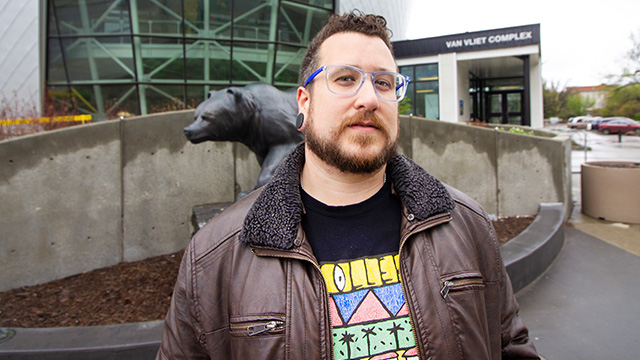
Travelling to Canada on a tourist visa, Coll could not have dreamt that twelve years later, he would cross the stage as a new Canadian citizen, with the 2019 graduating class of the U of A's Medical Laboratory Sciences (MLS) program.
In 2007, Sebastian Coll arrived in Calgary from his home in Mallorca, Spain, carrying nothing but two suitcases and his unshakeable determination. Travelling on a tourist visa, Coll could not have dreamt that twelve years later, he would cross the stage as a new Canadian citizen, with the 2019 graduating class of the U of A's Medical Laboratory Sciences (MLS) program.
"Sebastian always has a smile on his face," said Lisa Purdy, director of the MLS program and assistant dean, Graduate Student Affairs, Office of Advocacy and Wellbeing. "From the beginning he came in and got straight to work. As a newcomer he has had challenges to overcome, but he always makes the most of it. He is very resilient."
For Coll, the end of training marks a new beginning as a professional laboratory technologist. Learn more about his story in the following Q&A.
Where are you originally from? How is it different from life in Edmonton?
I was born and raised on the island of Mallorca, Spain. Us Mallorcans have a great sense of identity with a strong culture, cuisine and language. I think the major difference is physical space. Mallorca can get quite crowded, especially during the summer since the island hosts over 14 million tourists per season on average. Population densities tend to be much higher in European countries than in North America.
Weather is another big difference. I can't deny that winters are brutal here, but summers can get pretty nasty in Mallorca too, with temperatures up to 40 degrees Celsius and high humidity.
Life on the island is much calmer as well. Here, we can spontaneously hop into a car and drive 300 km, but in contrast, the island is about 50 km in length, and driving to a town at the other side can take weeks of preparation. I always think it's quite funny-they have a great road infrastructure, yet driving 30 km is like going to the other side of the world.
When it comes to the professional realm, options in Spain can be quite limited. I don't think there are as many opportunities for professional growth as there are here.
What brought you to Canada?
When I first arrived in Calgary I only intended to stay for the summer, but I liked it so much that I extended my visitor's visa. I was very lucky, because many foreign workers were being hired in Calgary at the time, especially in construction. I was able to get a work visa and was hired to work construction, which allowed me to stay in Canada. Canada is a country full of opportunities. If you work hard, have goals and are persistent, you can achieve whatever you want.
What is the biggest challenge that you had to overcome as a newcomer in Canada?
Starting anew. I only knew one person when I came here, so I had to spend a lot of time alone. I had to grow up quickly. Also, being half a world away from your family and friends-from everything you've ever known-I had to adapt and change.
How did you transition from construction work to the MLS program?
I started working at a garden centre after I got my permanent residency and I've always been interested in science. I learned that Canada has very good education, so I saw it as an opportunity to improve myself and learn more about the world. I applied and got accepted to the Bachelor of Science program at the University of Calgary and majored in cellular and molecular biology. But in second year I decided I wanted more-I wanted to start a career. So I decided to apply for the medical science program at the U of A, which is one of the best in the country.
What makes graduating from the MLS program a personal success for you?
Never giving up. And trust me, there were many times that I could have jumped on a plane and left. Also, always striving for more and wanting to better myself.
Pursuing a Canadian education was a goal I set for myself when I first became a permanent resident in Canada back in 2011, so graduating is a huge personal success. Also, MLS is a really tough program, but as long as you work hard, you come out of it as almost a different person-a medical professional. About 70 per cent of physician decisions are based on lab results, so it's crucial that we do an excellent job. It's critical, and anyone who graduates from MLS should feel extremely proud of themselves.